Find out “10 Best Exercises for Women Over 50 To Live Longer” Hitting the half-century mark is much more than a milestone birthday. It’s a testament to your resilience, wisdom, and perseverance. But turning the big 5-0 also means transformations for your body, like a slower metabolism and loss of muscle and strength, which is unfortunate since muscular strength is an essential component of healthy aging. Physical activity is an excellent way to combat the woes that come with growing older, and we’re here today with 10 active hobbies and exercises for women over 50 to live longer. The best part? You’ll likely enjoy doing them!
10 Best Exercises for Women Over 50 To Live Longer
For many women over 50, exercise becomes no longer about chasing your ideal physique or ultra high-intensity workouts. Now, it’s about longevity, vitality, and embracing a fitness routine that keeps your body healthy and thriving. But which exercises are best for extending your golden years? Here, we spoke with Rachel MacPherson, an ACE-certified personal trainer with Garage Gym Reviews, who shares a list of the 10 best exercises for women over 50 to live longer, more vibrant lives.
Read on for these expert-approved activities and exercises, then don’t miss The #1 Daily Walking Workout for Women to Get Fit.
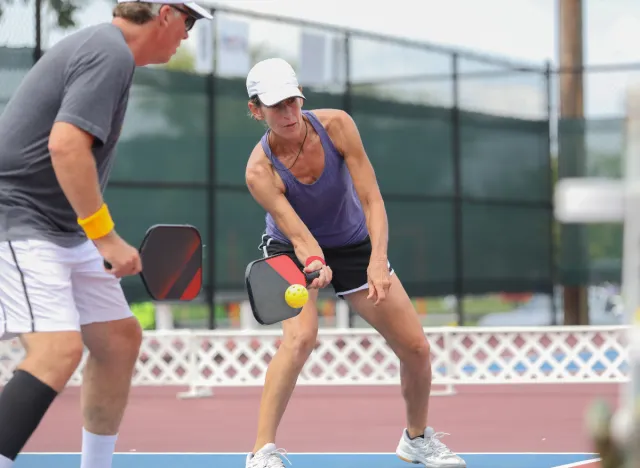

You’ve likely heard the buzz around pickleball. This fun paddle sport blends tennis, badminton, and ping-pong elements, making it perfect for those wanting to mix cardio with social interaction. Not only does pickleball keep you moving, but research shows it can also boost your mental health.
“Pickleball is one of the fastest-growing sports today, especially among older adults,” states MacPherson. “It’s the perfect sport for older people because it combines socializing with exercise, which is more challenging to come by as you age. Pickleball can provide a social outlet while helping prevent health concerns such as arthritis, stroke, type 2 diabetes, heart disease, and dementia.”
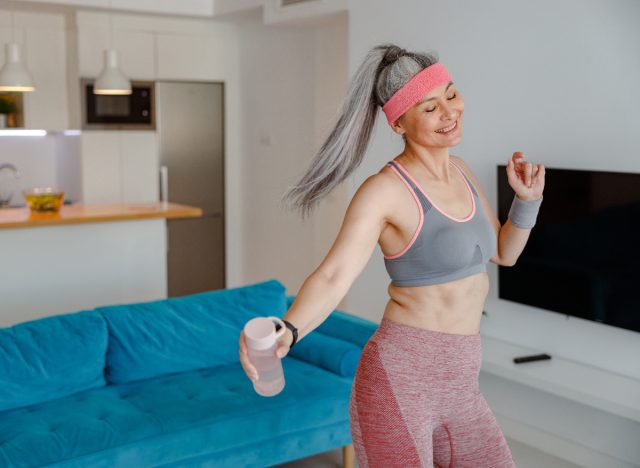

Whether swaying to ballroom tunes or getting your groove on with Zumba, dancing isn’t just fun; research shows it’s fantastic for mental health, cardiovascular fitness, and musculoskeletal strength.
“Dance classes are a fun way to socialize or bond with your partner (or meet someone new) while improving balance and coordination, two aspects of fitness that are crucial for aging adults,” says MacPherson. “Falls are among the most common risks that grow as you age and are the biggest culprit of fractures that lead to loss of independence and declining health. Dancing can also be a fantastic cardiovascular workout, improving heart health and protecting against cardiovascular disease, type 2 diabetes, stroke, and dementia, among other health concerns.”
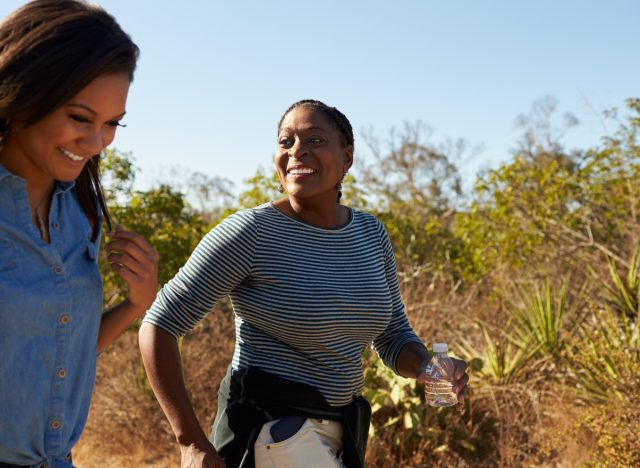

There’s something uplifting about combining social connection with physical activity. Joining a walking club ensures you get your steps in while enjoying good company. A recent study revealed that walking promotes healthy aging by reducing your risk of cardiovascular disease, type 2 diabetes, and dementia while enhancing your sleep, mental well-being, and longevity.
“Walking is an accessible form of exercise that everyone should do daily. Walking improves mental well-being, blood pressure, and blood sugar levels and helps increase daily activity levels, leading to overall calorie and weight balance. Walking as a group in a class or with a club can provide motivation and socialization, which are aspects of older adults’ fitness regimens that shouldn’t be overlooked for their importance,” explains MacPherson.
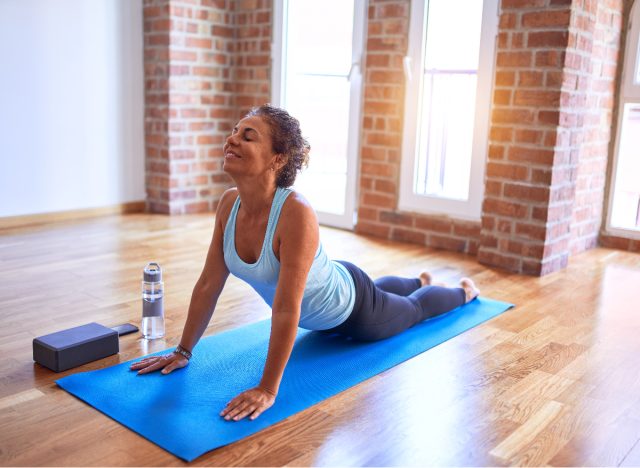

Beyond its well-documented benefits for flexibility and mental well-being, yoga is excellent for muscle toning and strength. Multiple studies show that yoga benefits balance, mental health, mobility, and cellular aging—all critical aspects of healthy aging.
“Gentle yoga classes are perfect for older adults who have trouble with more vigorous forms of exercise or want to add more relaxing and easy movement into their existing exercise routine. Yoga is a low-impact form of exercise that can boost joint health and help prevent falls,” says MacPherson.
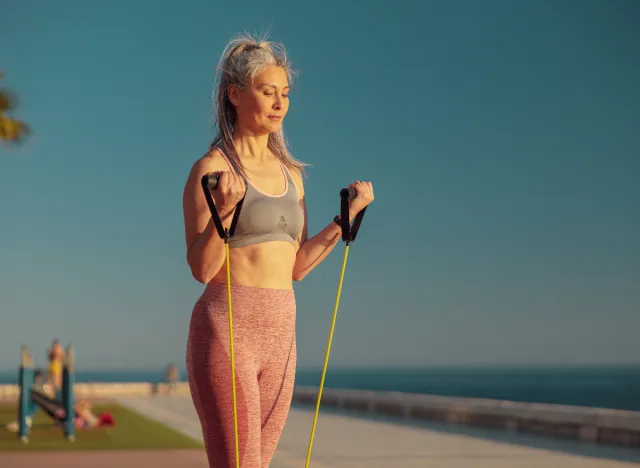

Resistance bands are the unsung heroes of home workouts. They’re adaptable, easy to store, and fantastic for strength training. According to a 2022 study, resistance bands can keep your muscles firm and functional as your muscles naturally lose mass with age.
“Every older adult should do some form of resistance training,” advises MacPherson. “Resistance bands or basic strength training helps prevent bone loss and can even increase it. Bone loss is a major issue for aging women, especially after menopause, when changing hormones leads to lower estrogen, which lowers bone mass. Resistance training helps prevent this from happening.”
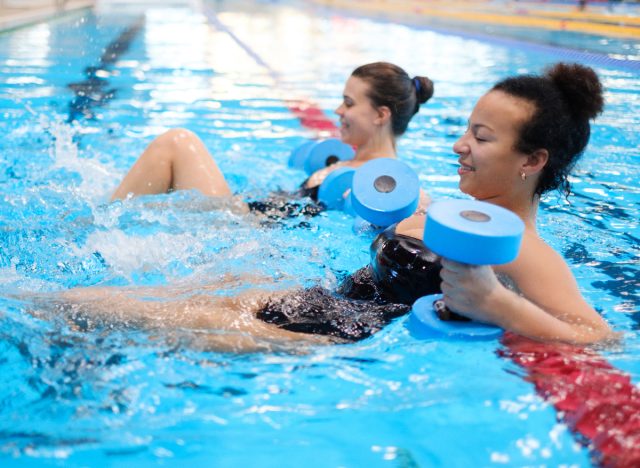

Engaging in water aerobics can improve cardiovascular health and muscle tone while protecting your joint health—a win-win for those over 50. Plus, water exercise has been associated with decreased pain for individuals dealing with arthritis.
MacPherson tells us, “Water aerobics is a classic exercise class for seniors since it’s low-impact, joint-friendly, and social. It can provide cardiovascular and strength training, improve heart health, endurance, and cognition, and prevent disease and illness. Water aerobics can positively impact functional fitness and body composition, which are both protective against loss of independence and all-cause mortality.”
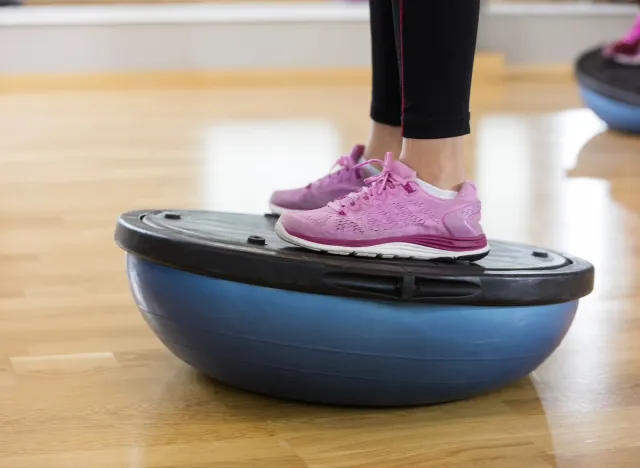

Stability might not sound as glamorous as strength or speed, but it’s vital for preventing falls and maintaining independence as you age. Simple exercises, like standing on one leg or using a balance board, can work wonders for your core strength and stability.
“Falls are one of the top reasons why older individuals end up in care homes,” says MacPherson. “Falls are also scary and can cause further injury and pain, including hip fractures. It’s wise to include balance and stability training in your routine. Try yoga, tai chi, or specific programs to improve your balance.”
This lesser-known exercise is excellent for targeting the chest and shoulder muscles. It might sound technical, but once you get the hang of it, the Svend press can be vital for maintaining upper-body strength.
“The Svend press is an excellent chest exercise to add to your chest workout, especially after completing some bench presses and flyers,” explains MacPherson. “It can improve shoulder joint health by strengthening surrounding musculature and tendons, and it’s joint-friendly, so you can use it to add volume to your training when your joints, triceps, and shoulders begin to fatigue.”
Start the exercise by lying on a bench, holding two dumbbells in the middle of your chest. Press the dumbbells into each other. Keep pressure, and extend your elbows to raise the dumbbells above your chest. Don’t lock out to maintain the tension, then reverse the motion. Drive your feet into the ground for support. Perform three sets of 10 to 15 reps.
Squats are a go-to exercise for leg and glute strength. When done correctly, deep squats can improve flexibility and engage multiple muscle groups, ensuring your lower body remains strong and agile.
“In many countries, squatting multiple times per day is commonplace,” says MacPherson. “Women in these countries can easily squat to the ground without any pain or dysfunction and, as a result, have excellent mobility in their hips, spine, knees, and ankles. While you don’t necessarily have to squat with weights, a deep yogic squat or a simple bodyweight squat will help improve your mobility and stability for less likelihood of pain and muscle dysfunction. You can start by practicing a deep squat while holding onto a post or door frame for support.”
Hinge your hips, and bend your knees to lower your torso toward the floor. Keep your chest up high and your back as straight as you can. If you can manage a deep squat, try placing your elbows inside your knees and pressing your hands together to push your knees apart further and deepen the stretch. Hold here, and breathe for a few breaths before standing. Do three sets of 60-second holds daily for best results.
If traditional pushups feel challenging, incline pushups are an excellent alternative.
“Pushups help build chest, core, and arm strength, which can be lacking in women but is vital for protecting the spine, neck, and shoulders from pain and injury and improving daily functioning,” states MacPherson. “Perform a pushup with your upper body leaning against a steady, elevated surface, such as a weight bench or sofa. The higher the incline, the easier the exercise will be.”
Place your hands wider than chest-width apart, with your chest aligned with the edge of the elevated surface. Slowly lower yourself toward it by bending your elbows, which should be pointing diagonally behind and away from you. Lower until your chest touches the surface, then press back up. Aim to complete two to three sets of as many reps as possible.



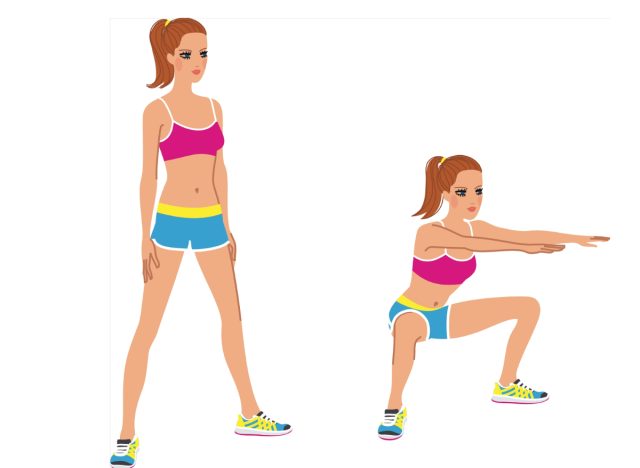





3 comments
Comments are closed.